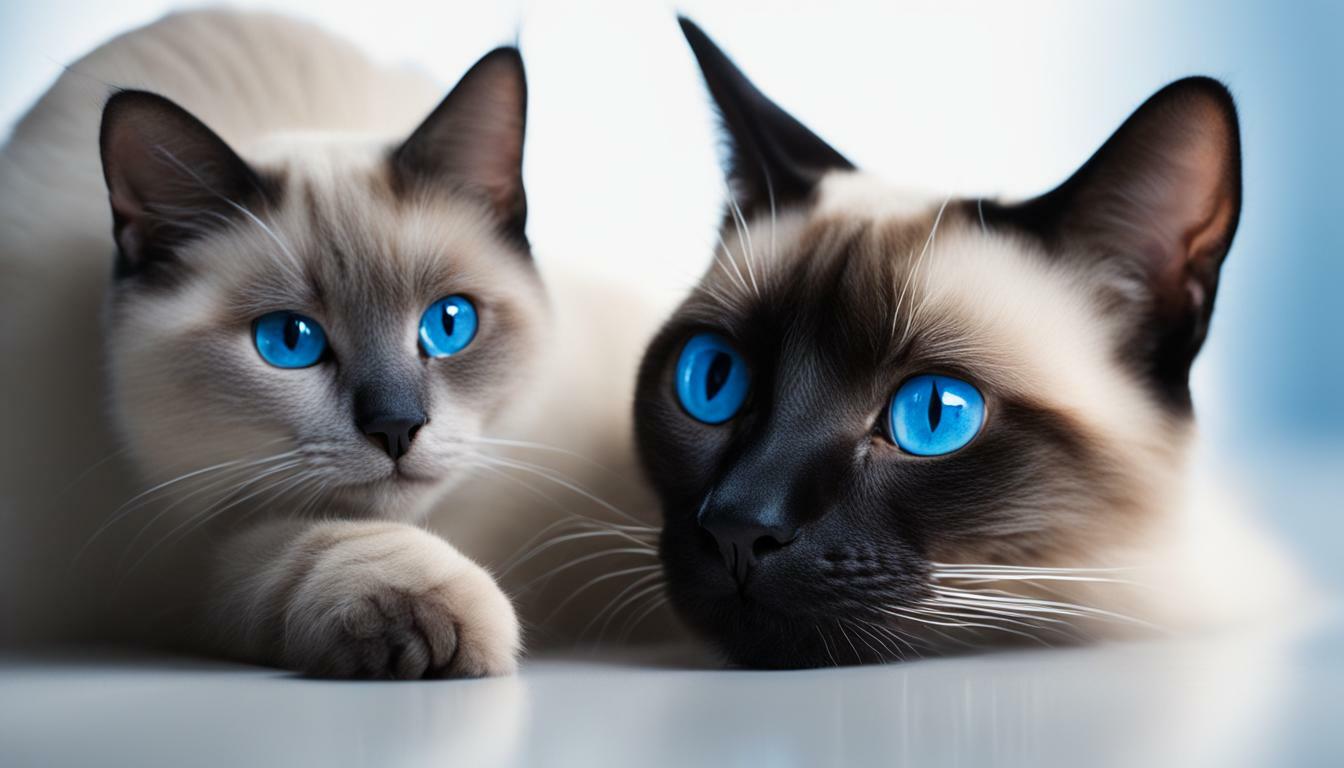Are Siamese cats hypoallergenic? Let’s find out if they can be the perfect choice for allergy sufferers.
Key Takeaways:
- Siamese cats are considered hypoallergenic due to their reduced shedding and lower levels of the allergenic Fel d 1 protein.
- No cat breed is entirely hypoallergenic, as all cats produce some level of allergens.
- People with mild cat allergies may be able to live comfortably with Siamese cats.
- To minimize allergic reactions, regular grooming, frequent washing of fabrics and clothes, daily vacuuming and dusting, and creating cat-free zones in the house are recommended.
- Other hypoallergenic cat breeds include Balinese-Javanese, Siberian, Devon Rex, Sphynx, Bengal, and Ocicat.
- Diet and nutrition play a role in reducing shedding and managing allergies in Siamese cats. A well-balanced diet with high-quality animal protein and essential vitamins and minerals can help minimize shedding and nourish the skin and coat.
- Untamed wet cat food offers balanced nutrition, exclusive animal proteins, and is free from common allergens, making it suitable for managing allergies in Siamese cats.
Understanding Hypoallergenic Cat Breeds
If you’re looking for a cat that won’t aggravate your allergies, consider these hypoallergenic cat breeds. While no cat can be completely hypoallergenic, some breeds are known to produce fewer allergens and are more compatible with individuals who have allergies. These cat breeds have specific characteristics that make them less likely to trigger allergic reactions.
One of the hypoallergenic cat breeds is the Siamese cat. Siamese cats shed less and produce smaller amounts of the Fel d 1 protein, which is the main culprit behind allergy symptoms. This protein is found in a cat’s saliva, urine, and skin glands. Siamese cats are known for their sleek coats and low levels of shedding, making them suitable for allergy sufferers.
“Siamese cats are considered to be hypoallergenic because they shed less and produce smaller amounts of the Fel d 1 protein.”
Other hypoallergenic cat breeds worth considering include the Balinese-Javanese, Siberian, Devon Rex, Sphynx, Bengal, and Ocicat. These breeds have varying levels of allergenicity and may cause fewer allergic reactions compared to other cat breeds. However, it’s important to note that individual experiences with allergens can differ, and what may work for one person may not work for another.
| Hypoallergenic Cat Breeds | Allergenicity Level |
|---|---|
| Balinese-Javanese | Low |
| Siberian | Low |
| Devon Rex | Low |
| Sphynx | Low |
| Bengal | Low |
| Ocicat | Low |
Managing Allergies with Hypoallergenic Cats
To minimize allergic reactions and enjoy a harmonious relationship with a hypoallergenic cat, it’s important to take some precautions. Regular grooming is essential, as it helps remove loose hair and dander from the cat’s coat. This can be done through brushing or using special grooming tools designed to reduce shedding.
Cleaning your home regularly is another key factor in managing allergies. Laundering fabrics, such as bedding and curtains, frequently helps remove allergens. Vacuuming and dusting on a daily basis can also reduce the presence of airborne allergens. Consider creating cat-free zones in your house, such as bedrooms or areas where you spend a significant amount of time, to minimize exposure to allergens.
“Regular grooming is essential, as it helps remove loose hair and dander from the cat’s coat.”
While hypoallergenic cat breeds can provide a more allergy-friendly environment, it’s crucial to consult with allergists and spend time with the breed to ensure compatibility. Each person’s allergies are unique, and what works for one individual may not work for another. With proper care and management, however, it is possible to enjoy the companionship of a cat without severe allergic reactions.
Siamese Cats and Allergies
Siamese cats have unique qualities that make them a popular choice for individuals with allergies. They are often considered hypoallergenic because they shed less and produce smaller amounts of the Fel d 1 protein that triggers allergies in people. However, it’s important to note that there is no entirely hypoallergenic cat breed, as all cats produce some level of allergens.
For people with mild cat allergies, living with a Siamese cat can typically be manageable without severe reactions. Regular grooming is essential to minimize allergens, as it helps to remove loose hair and dander. The Siamese cat’s short coat makes grooming relatively easy and less time-consuming compared to long-haired breeds. Additionally, bathing your Siamese cat occasionally can also help reduce allergens on their fur.
Cleaning the environment is another crucial step in managing allergies when living with a Siamese cat. Regularly washing fabrics and clothes, vacuuming and dusting the house, and using air purifiers can help minimize allergens in the living space. Creating specific cat-free zones in the house, such as bedrooms or certain furniture, can provide allergy sufferers with a safe haven.
Siamese Cat Breed Information
| Origin | Appearance | Temperament |
|---|---|---|
| Thailand (formerly Siam) | Elongated body, striking blue eyes, short coat | Intelligent, sociable, vocal |
Siamese cats are known for their distinctive appearance and personality. They originated in Thailand, formerly known as Siam, and have become one of the most recognized cat breeds. With their elongated bodies and striking blue eyes, Siamese cats are truly captivating. Their short coat requires minimal grooming, making them a practical choice for people with allergies.
Temperament-wise, Siamese cats are highly intelligent, sociable, and vocal. They enjoy human companionship and thrive in interactive environments. These cats are known for their strong attachment to their owners and their desire to be involved in every aspect of their lives. Siamese cats are known to communicate with a distinct vocalization called “meow talk,” making them even more endearing to their human counterparts.
In conclusion, Siamese cats can be a great option for individuals with allergies, thanks to their hypoallergenic qualities. However, it’s essential to remember that the effectiveness of hypoallergenic breeds varies from person to person. If you have severe allergies, consulting with an allergist and spending time with a Siamese cat beforehand can help determine if they are the right fit for you.
Managing Allergies with Siamese Cats
Living with a Siamese cat while managing allergies is possible with these helpful strategies. While Siamese cats are considered hypoallergenic due to their reduced shedding and lower levels of the Fel d 1 protein that triggers allergies, it’s important to note that no cat breed is entirely allergen-free.
To minimize allergic reactions, regular grooming is crucial. Brushing your Siamese cat’s fur regularly helps to remove loose hair and dander, reducing the amount of allergens in your home. Additionally, regular baths can help eliminate any surface allergens from their coat.
Cleaning your living space is equally important. Frequent washing of fabrics, including bedding and curtains, can help remove allergens. Vacuuming and dusting your home daily can also help reduce the presence of allergens. Creating cat-free zones, such as bedrooms or specific areas of the house, can provide allergy sufferers with a sanctuary from potential triggers.
While Siamese cats may be a suitable option for individuals with mild cat allergies, it’s essential to consult with an allergist before making a decision. They can provide personalized advice and guidance based on your specific allergy profile.
| Helpful Strategies for Managing Allergies with Siamese Cats: |
|---|
|
|
|
|
“Living with a Siamese cat while managing allergies is possible with proper care and maintenance.” – Allergy Specialist
The Role of Diet in Reducing Allergies
A proper diet can make a significant difference in minimizing allergies and shedding in Siamese cats. Providing a well-balanced diet with high-quality animal protein and essential vitamins and minerals can help minimize shedding and nourish the skin and coat. When choosing cat food for your Siamese cat, consider options that are specifically designed for managing allergies.
“Untamed wet cat food” is an excellent choice for Siamese cats with allergies. It offers balanced nutrition, exclusive animal proteins, and is free from common allergens, making it suitable for managing allergies in Siamese cats. This type of wet cat food is designed to support optimal skin and coat health, which can help reduce shedding and minimize the allergens released into the environment.
| Benefits of Untamed Wet Cat Food: | |
|---|---|
| 1. Balanced Nutrition: | Untamed wet cat food provides a complete and balanced diet, ensuring your Siamese cat receives all the necessary nutrients for optimal health. |
| 2. Exclusive Animal Proteins: | This cat food contains high-quality animal proteins, which are essential for muscle development and overall well-being. |
| 3. Free from Common Allergens: | Untamed wet cat food is formulated without common allergens such as grains, artificial additives, and fillers, making it ideal for cats with allergies. |
In addition to providing a balanced diet, ensure your Siamese cat has access to fresh water at all times. Proper hydration is essential for maintaining healthy skin and coat. Regular grooming, including brushing your cat’s fur, can help remove loose hairs and reduce shedding. It’s also important to wash fabrics and clothes frequently to minimize allergens in the environment.
By taking these steps and providing a suitable diet, you can help manage allergies and reduce shedding in your Siamese cat, allowing for a more comfortable living environment for both you and your beloved feline companion.
Other Hypoallergenic Cat Breeds
If Siamese cats aren’t the perfect fit for you, consider these other hypoallergenic cat breeds. These breeds are known for producing fewer allergens and are often recommended for individuals with allergies:
- Balinese-Javanese: Similar to the Siamese cat, the Balinese-Javanese breed has a luxurious coat, but with less shedding and fewer allergens. Their silky fur is hypoallergenic, making them a great choice for allergy sufferers.
- Siberian: Despite their long and thick coat, Siberian cats produce lower levels of allergens compared to other breeds. They have a gentle and friendly nature, making them popular for families.
- Devon Rex: The Devon Rex has a unique curly coat, which contributes to its hypoallergenic qualities. These cats have less hair to shed and produce fewer allergens, making them suitable for individuals with allergies.
- Sphynx: The Sphynx is a hairless cat breed known for its lack of fur. Without fur to shed, they produce fewer allergens and are often considered hypoallergenic. It’s important to note that some people may still be allergic to the Sphynx breed due to other allergens like dander.
- Bengal: The Bengal breed is known for its striking spotted coat. While they do shed, the Bengal cats produce fewer allergens, making them a viable option for individuals with allergies.
- Ocicat: The Ocicat has a short, sleek coat that sheds minimally. They are known for being playful and sociable, making them a great choice for families. Their low-allergen coat makes them suitable for those with allergies.
To further reduce allergic reactions, it’s important to groom these hypoallergenic cat breeds regularly. This can include brushing their coats to remove loose hair, wiping them down with damp cloths to remove allergens, and keeping their living spaces clean and free of dust and dander.
Additionally, diet and nutrition play a role in managing allergies in Siamese cats and other hypoallergenic breeds. Feeding them a well-balanced diet with high-quality animal protein and essential vitamins and minerals can help minimize shedding and nourish their skin and coat. Consider using untamed wet cat food, which offers balanced nutrition and is free from common allergens, making it suitable for managing allergies in these breeds.
| Breed | Hypoallergenic Qualities | Characteristics |
|---|---|---|
| Balinese-Javanese | Silky fur, less shedding, fewer allergens | Luxurious coat, affectionate nature |
| Siberian | Lower allergen levels, gentle disposition | Long and thick coat, friendly personality |
| Devon Rex | Curly coat, less hair to shed, fewer allergens | Unique appearance, playful temperament |
| Sphynx | Hairless, minimal shedding, fewer allergens | No fur, affectionate and energetic |
| Bengal | Fewer allergens, striking spotted coat | Active and playful, highly intelligent |
| Ocicat | Low-allergen coat, minimal shedding | Sleek coat, sociable and outgoing |
Conclusion
Siamese cats offer a potential solution for those with allergies, but it’s essential to consider various factors before bringing one into your home. These beautiful felines are often considered hypoallergenic due to their reduced shedding and lower production of the Fel d 1 protein, which triggers allergies in people. While no cat breed is entirely hypoallergenic, Siamese cats are generally well-tolerated by individuals with mild cat allergies.
To minimize allergic reactions when living with a Siamese cat, regular grooming is crucial. Brushing their fur frequently helps to remove loose hair and dander, reducing allergens in the environment. Additionally, washing fabrics and clothes regularly can prevent allergens from accumulating. Daily vacuuming and dusting can also help eliminate allergens from the living space.
Creating cat-free zones in your home is another effective way to manage allergies. Designating certain areas where the cat is not allowed can provide a refuge for allergy-sensitive individuals, minimizing their exposure to allergens.
It’s worth noting that there are other hypoallergenic cat breeds besides Siamese cats. The Balinese-Javanese, Siberian, Devon Rex, Sphynx, Bengal, and Ocicat are all known for producing fewer allergens compared to other breeds. However, individual experiences may vary, and it’s important to spend time with each breed to determine personal tolerance.
In addition to grooming practices and creating allergen-free spaces, diet and nutrition also play a role in managing allergies in Siamese cats. Providing a well-balanced diet rich in high-quality animal protein, essential vitamins, and minerals can help reduce shedding and nourish the skin and coat. Untamed wet cat food offers precisely that—balanced nutrition, exclusive animal proteins, and a formula free from common allergens, making it an excellent choice for allergy management in Siamese cats.
FAQ
Q: Are Siamese cats hypoallergenic?
A: Siamese cats are considered to be hypoallergenic because they shed less and produce smaller amounts of the Fel d 1 protein that triggers allergies in people. However, all cats produce some level of allergens, so there is no entirely hypoallergenic cat breed.
Q: Can people with mild cat allergies live with Siamese cats?
A: Yes, people with mild cat allergies can typically live with Siamese cats without severe reactions. However, individual experiences may vary, so it’s essential to spend time with the breed before making a decision.
Q: How can I minimize allergic reactions when living with a Siamese cat?
A: To minimize allergic reactions, cat owners should regularly groom their Siamese cats, wash fabrics and clothes frequently, vacuum and dust daily, and create cat-free zones in the house. These measures can help reduce the presence of allergens and create a more allergy-friendly environment.
Q: What other hypoallergenic cat breeds are there?
A: Other hypoallergenic cat breeds include Balinese-Javanese, Siberian, Devon Rex, Sphynx, Bengal, and Ocicat. These breeds are known for producing fewer allergens and are suitable options for individuals with allergies.
Q: Does diet play a role in reducing allergies in Siamese cats?
A: Yes, diet and nutrition can contribute to reducing shedding and managing allergies in Siamese cats. Providing a well-balanced diet with high-quality animal protein and essential vitamins and minerals can help minimize shedding and nourish the skin and coat.
Q: Is wet cat food suitable for managing allergies in Siamese cats?
A: Yes, Untamed wet cat food offers balanced nutrition, exclusive animal proteins, and is free from common allergens, making it suitable for managing allergies in Siamese cats. It can help support their overall health and minimize allergic reactions.



